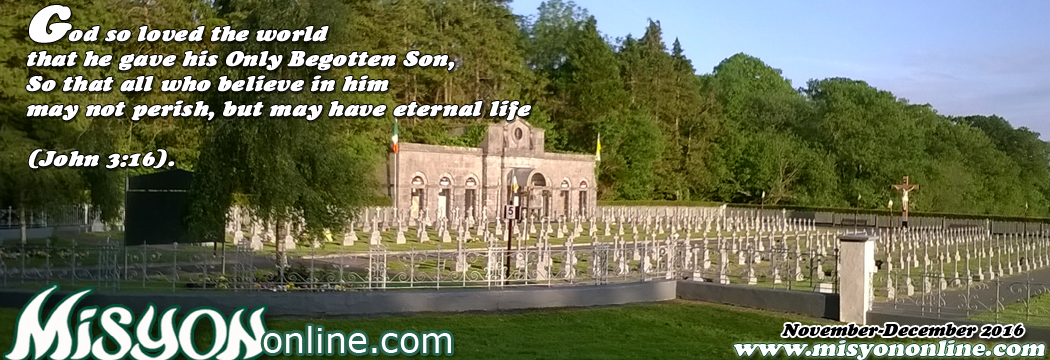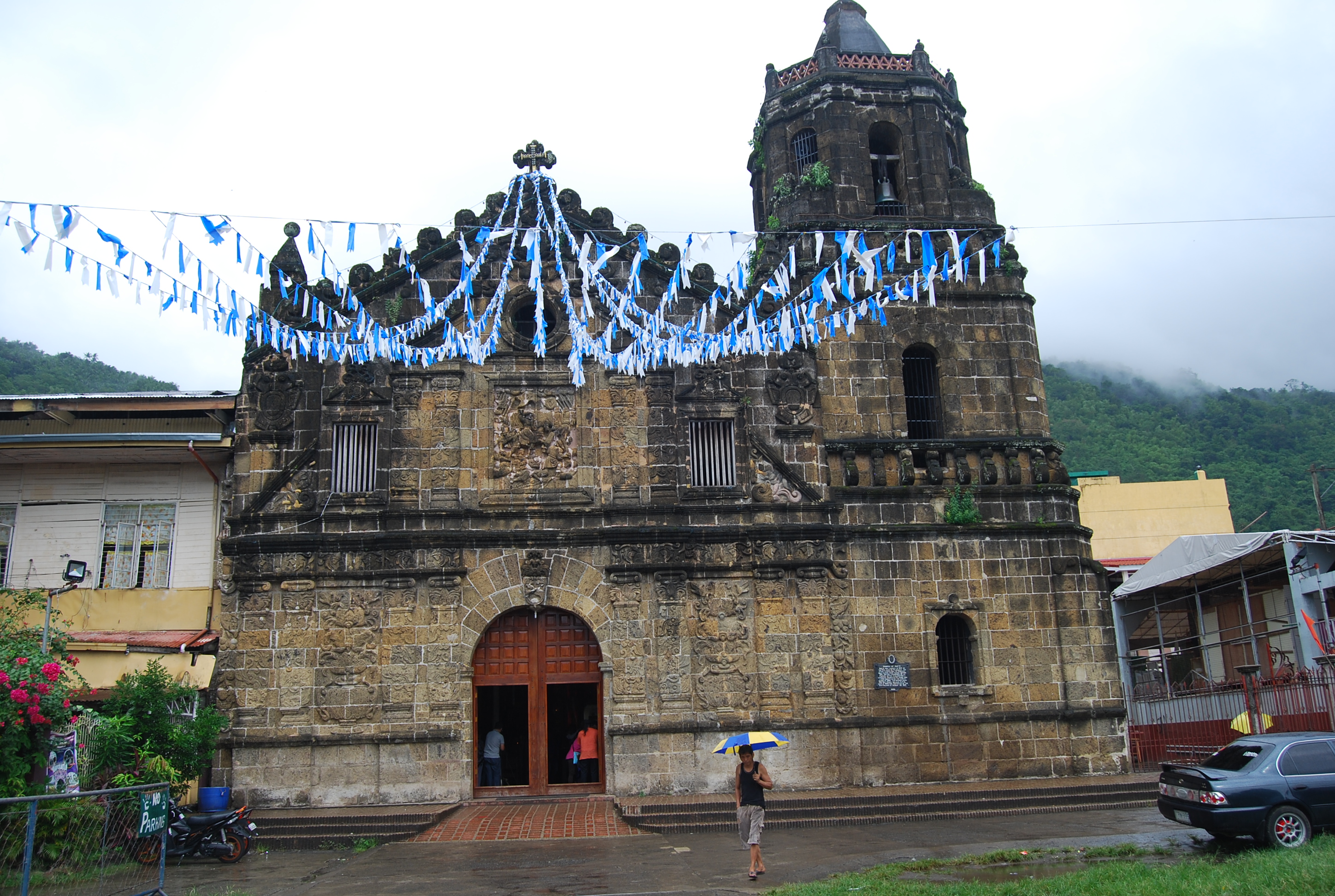Homily at Memorial Mass of Fr Francis Vernon Douglas
Church of St James the Apostle, Paete, Laguna, Philippines
By Fr John Keenan
On 28 September this year a group of Columban priests, Columban Lay Missionaries and co-workers, along with four relatives of Columban Fr Francis Vernon Douglas from New Zealand set off on a one-day pilgrimage to the two places associated with his death in 1943, Pililla, Rizal, and Paete, Laguna. Here is the homily given by Fr John Keenan, a Columban who came to the Philippines from Ireland in 1966, at the Mass in the church of St James the Apostle, Paete. His article, Here Was a Strong and Brave Man, first published in MISYON in January-February 2001, has renewed awareness of the martyrdom of this heroic priest from New Zealand.
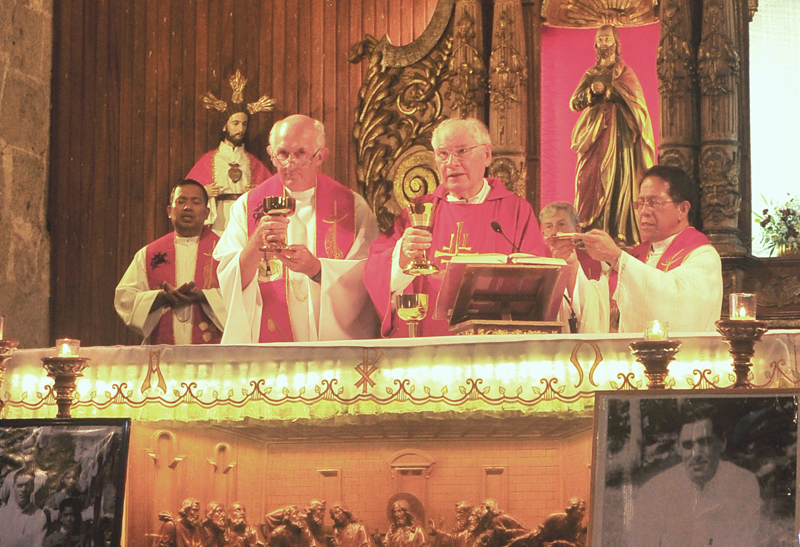
Fr John Keenan and concelebrants
Magandang hapon po sa inyong lahat at maraming salamat para sa inyong pagdalo sa Misang ito para kay Padre Francis Vernon Douglas. Having traced the last journey of Fr Vernon Douglas from Pililla Catholic church where he was abducted to this church of St James the Apostle, we have reached the goal of our pilgrimage. It was here that Fr Vernon spent the last three tortuous days of his life. We remember him affectionately and pray for his eternal repose.
Good afternoon everyone and many thanks for joining us at this Mass in memory of Fr Francis Vernon Douglas. A special welcome to his niece Verne and her husband Cliff Turner, also to his nephew Vernon Douglas and his son Brendan. It is wonderful that you are here all the way from New Zealand. Very many thanks to your parents and grandparents for the big sacrifice which they made at the time of the death of Fr Vernon.
Our feast today is that of St Lorenzo Ruiz and companions who were martyred in Japan some 400 years ago. Like them, Fr Vernon was made to endure terrible tortures for his faith in Jesus Christ. It is providential and a great co-incidence that our theme for today is that of martyrs.
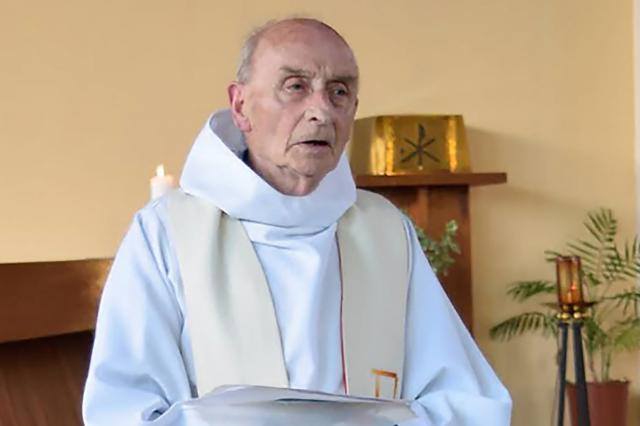
Fr Jacques Hamel
(30 November 1930 – 26 July 2016) [FB]
In his homily to the relatives of Fr Jacques Hamel, 85, the elderly priest who was murdered by members of the Islamic State (near Rouen, France), Pope Francis said that there are more martyrs for the faith in modern times than in the early days of Christianity. In our times many priests, sisters and lay people have been killed for their Christian witness.
Pope Francis speaks about the martyrs of our times
Some 400 years ago Filipino St Lorenzo Ruiz and his companions were martyred in Japan, also St Pedro Calungsod, a Filipino catechist was killed in the Marianas Islands.
In February 1945 five Columbans were martyred in Malate parish and more recently Fr Tom Flynn in Labrador, Pangasinan in 1950, Fr Martin Dempsey shot dead in Mindanao in 1970 and Fr Rufus Halley mowed down in 2001 also in Mindanao.
Before them Fr Francis Vernon Douglas at the age of 33, after being severely tortured in this Church of St James, Paete, was killed on 27 July 1943 – 73 years ago. Our presence here today means that his supreme sacrifice is not forgotten, nor should it ever be.
When news of the martyrdom of St Lorenzo Ruiz (and companions) reached Manila all the church bells in the diocese were rung in thanksgiving to God for their fidelity to their faith in Jesus Christ. So here also we joyfully give thanks for Fr Vernon’s splendid and heroic witnessing to his Catholic and Christian faith.
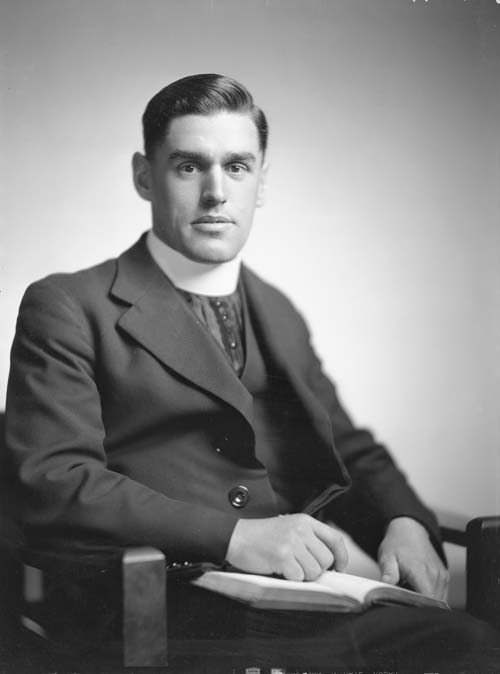
Fr Francis Vernon Douglas
Fr Francis Vernon Douglas was born on Sunday 22 May 1910 to Catherine Gaffney from Ireland and George Douglas from Australia, in Johnsonville, Wellington, New Zealand, the fifth of eight children. After graduating as valedictorian from Mosgiel at the age of 14 to help his family financially he worked in the local post office and later as postmaster for three years. Responding to the call to priesthood, he entered Holy Cross Seminary in Mosgiel destined to serve in the Archdiocese of Wellington. After eight fulfilling years he was ordained a priest on 29 October 1934. For over three years he worked zealously in various parishes in his home diocese of Wellington.
Sensing a call to be a missionary he applied to Fr Luke Mullany, superior of the Columbans in Australia and New Zealand, who accepted him as a member of the Missionary Society of St Columban in 1937. After a year’s study and preparation he was sent to the Philippines and arrived in Manila in July 1938. After a brief stay in Malate he was assigned to Binangonan and Morong (both in Rizal) to learn the local language, Tagalog.
At the early age of 28 he was assigned as parish priest to Pililla, Rizal. This parish was very much run-down having been 40 years without a resident priest. Because of typhoons and floods the church and convento (rectory/presbytery) were in bad shape. Being young and energetic he set to work along with the local people and gradually renovated the church and convento where he lived. Through liturgies, catechesis, meetings they gradually built a loving Christian Community. As a zealous priest he often visited outlying villages to attend to the sick and respond to the various needs of the people in the hills around Pililla.
At that time many of the people in the hills resisted the Japanese military police known as the dreaded Kempeitai. In the eyes of the Japanese he was ‘an enemy alien’ and was suspected of collaborating and spying for the guerrillas.
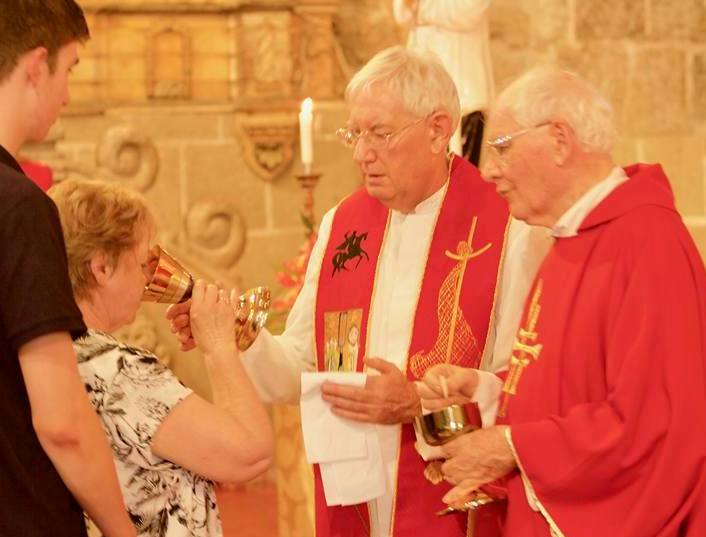
Mrs Verne Turner, Fr Dan O’Malley and Fr John Keenan
Mrs Turner, whose mother was a sister of Fr Vernon, was born on the day in 1945 when the Douglas family learned of his death in 1943, hence her name.
On the afternoon of Saturday 24 July 1943 he was interrogated by the Japanese in his convent. He was heard to say in answer to a question, ‘I cannot answer you and you have no right to ask me that question’. Many believe that he was referring to the seal of confession which he refused to break regarding what he knew about the guerrillas. He was abducted from the convento that day and brought by truck to this Church here in Paete. This was used as a concentration camp with some 1,700 prisoners, men and youths held in atrocious conditions.
The sacristy was used as a torture chamber where many prisoners died. Here he was taken and severely tortured. He was given the dreaded water–cure but still refused to give any information. Like Jesus before Pilate he uttered not a word. Later he was tied to the altar rails and further beaten. Let us imagine the scene in this very church: ‘ECCE HOMO’, ‘BEHOLD THE MAN’, put before all the frightened prisoners as to what might happen to them also. Then he was dragged to the baptistery and tied to the font and further tortured.
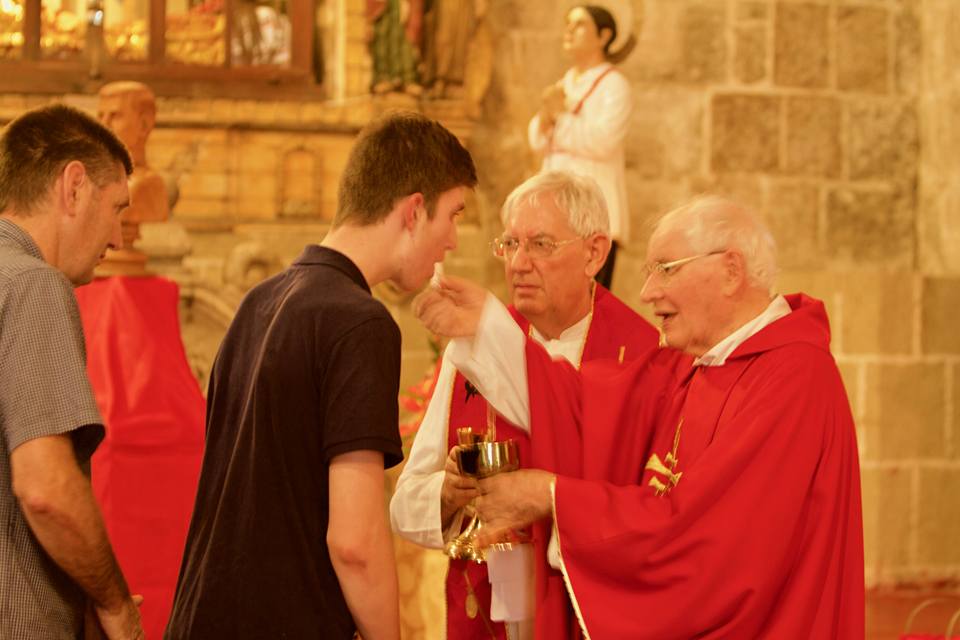
Vernon and Brendan Douglas with Frs O’Malley and Keenan
Vernon is a nephew of Fr Douglas, a cousin of Verne and the father of Brendan
Later he was manacled to the post beside it under the choir loft there. With one hand tied to the post above his head he was left to stand for two days and two nights. He was allowed neither food nor drinks even though the people had brought some for him. His eyes, swollen and bloody were fixed on the tabernacle while he fingered his rosary beads, which he was allowed to keep. Like Jesus before his tormentors he remained silent.
Realising that the end was near he asked to see the local parish priest, Fr Nicomedes Rosal, to whom he made his last confession.
Later, as night was falling, he was bundled into the back of a truck and driven off into the night in the direction of Sta Cruz (capital of Rizal Province). He was never seen again. The speculation is that he died from the effects of the beatings and torture he endured, or that he was killed and buried in an unmarked grave in a rice-field or in the vicinity of Sta Cruz town.
Pope Francis called the French priest who was murdered a couple of months ago in his parish in northern France a martyr. He said that we can pray for him and pray to him for our various needs and petitions. Fr Hamel suffered only for a couple of minutes. Fr Vernon suffered excruciatingly for three days and three nights. We also can pray for him and to him for our sick and for other needs.
The prisoners did not fail to notice that torture on them ceased after Fr Vernon’s arrival. All the anger seemed to be concentrated on him. They thought of him as their savior, like Jesus.
Some 2,700 years ago the prophet Isaiah said: ‘Yet it was our pain that he bore, our sufferings he endured . . . by his wounds we were healed (Isaiah 53:4-5). Fr Vernon’s faith, courage, commitment and fidelity to the end are an inspiration and example for all of us Columban missionaries and everybody else to follow.
Within a short time after Vernon’s death the zoning of the town ceased and all the prisoners were released and allowed to return to their homes. Maybe someday, with God’s help, Fr Francis Vernon Douglas will be listed with the church’s martyrs. He may become the first (canonized) Columban saint and the first saint and martyr from New Zealand.
Maraming salamat kay Fr Noel Canopio, Parish Priest, sa Sangguniang Pastoral ng parokya ni St. James Apostle at sa inyong lahat. (Many thanks, to Fr Noel Canopio, Parish Priest, and to the Parish Council, and to all).
Church of St James the Apostle, Paete

